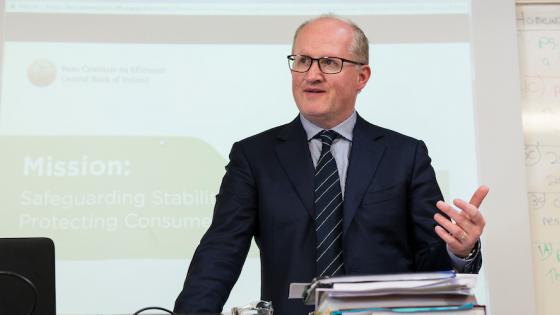
Philip Lane, the next chief economist of the ECB
Philip Lane, a CEPR Research Fellow, will soon become the ECB's chief economist. Read this selection of his columns to find out his opinions on the euro area, financial stability, and monetary policy.
Search the site

Philip Lane, a CEPR Research Fellow, will soon become the ECB's chief economist. Read this selection of his columns to find out his opinions on the euro area, financial stability, and monetary policy.
Philip Lane, Governor of the Central Bank of Ireland, Whately Professor of Political Economy at Trinity College Dublin and CEPR Research Fellow, is the only candidate nominated to succeed Peter Praet as the ECB's chief economist. He has also chaired the Advisory Scientific Committee of the European Systemic Risk Board.
Philip has been Director of the International Macroeconomics and Finance Programme at CEPR, and has been frequent contributor to VoxEU since 2007, when his first column for CEPR's new site explored whether Europe should care about global imbalances.
The feasibility of sovereign bond-backed securities for the euro area
Philip Lane, Sam Langfield
28 February 2018, 7977 reads
The euro area’s macro-financial framework is incomplete and fragile. This column highlights how a market for sovereign bond-backed securities could help to enhance financial stability by providing automatic stabilisation. Drawing on a recent feasibility study published by a High-Level Task Force of the European Systemic Risk Board, it outlines how to pave the way for market development by removing regulatory obstacles.
Emerging economy corporate debt: The threat to financial stability
Viral Acharya, Stephen Cecchetti, José De Gregorio, Sebnem Kalemli-Ozcan, Philip Lane, Ugo Panizza
05 October 2015, 29666 reads
Emerging market firms have borrowed in foreign currency to take advantage of low interest rates. This column argues that when the Fed inevitably raises rates, such borrowing will be a threat to emerging economy financial systems. Yet so long as authorities use their existing prudential tools wisely, the risks appear manageable.
International financial flows and the Eurozone crisis
Philip Lane
7 September 2015, 6797 reads
In the lead up to the global financial crisis, there was a substantial credit boom in advanced economies. In the Eurozone, cross-border flows played an especially important role in the boom-bust cycle. This column examines how the common currency and linkages between member states contributed to the Eurozone crisis. A very strong relationship between pre-crisis levels of external imbalances and macroeconomic performance since 2008 is observed. The findings point to the importance of delinking banks and sovereigns, and the need for macro-financial policies that manage the risks associated with excessive international debt flows.
CEPR Report: A New Start for the Eurozone: Dealing with Debt
Giancarlo Corsetti, Lars Feld, Philip Lane, Lucrezia Reichlin, Hélène Rey, Dimitri Vayanos, Beatrice Weder di Mauro
15 April 2015, 21789 reads
The Eurozone’s problems of poor growth and the threat of financial instability are rooted in its very foundation. The authors of the inaugural Monitoring the Eurozone report, launched today, consider three means by which the Eurozone can protect itself from structural failure. Their recommendations, which do not require Treaty changes, are crucial in offsetting the major risks a repetition of the recent Crisis would present.
Cross-border financial linkages: Identifying and measuring vulnerabilities
Philip Lane
26 January 2015, 11387 reads
There has been spectacular growth in cross-border financial linkages over the last 20 years. Moreover, boom-bust cycles in international financial flows have contributed to financial instability and financial crises in a number of countries. While the coverage of international financial datasets has sharply improved in recent years, this column introduces CEPR Policy Insight 77, explaining that the currently available data lacks the detailed information (in particular, the matrix of cross-border sectoral exposures) to provide a sufficient basis for risk surveillance and monitoring. Accordingly, a high priority for policymakers is to implement current proposals to improve the scope and quality of international financial data.
Banks and cross-border capital flows: Policy challenges and regulatory responses
Markus K Brunnermeier, José De Gregorio, Philip Lane, Hélène Rey, Hyun Song Shin
7 October 2012, 28541 reads
Many argue that the financial sector is in dire need of reform but there is always the danger of solving one problem by creating another. This column outlines the findings of the Committee for International Economic Policy and Reform. It takes stock of the traditional case for financial liberalisation and asks which principles have withstood the test of recent events and which ones now need re-thinking.
Cross-border banking in Europe
Franklin Allen, Thorsten Beck, Elena Carletti, Philip Lane, Dirk Schoenmaker, Wolf Wagner
20 June 2011, 30150 reads
The global crisis has provided compelling evidence of the need to understand the role of banks in international finance. This column introduces a new CEPR report analysing key aspects of cross-border banking taking a European focus. The report argues that policy reforms in micro- and macro-prudential regulation and macroeconomic policies are urgently needed for Europe to improve its efficiency and reduce its risk.
Rethinking national fiscal policies in Europe
Philip Lane
17 June 2010, 18300 reads
The global crisis has developed into a fiscal crisis within the Eurozone. This essay argues that fiscal policy during normal times must be sufficiently sustainable and counter-cyclical to enable aggressive fiscal intervention in the event of a major negative shock. It says that the solution is to set up independent fiscal councils in Eurozone member countries.
3,570 Reads